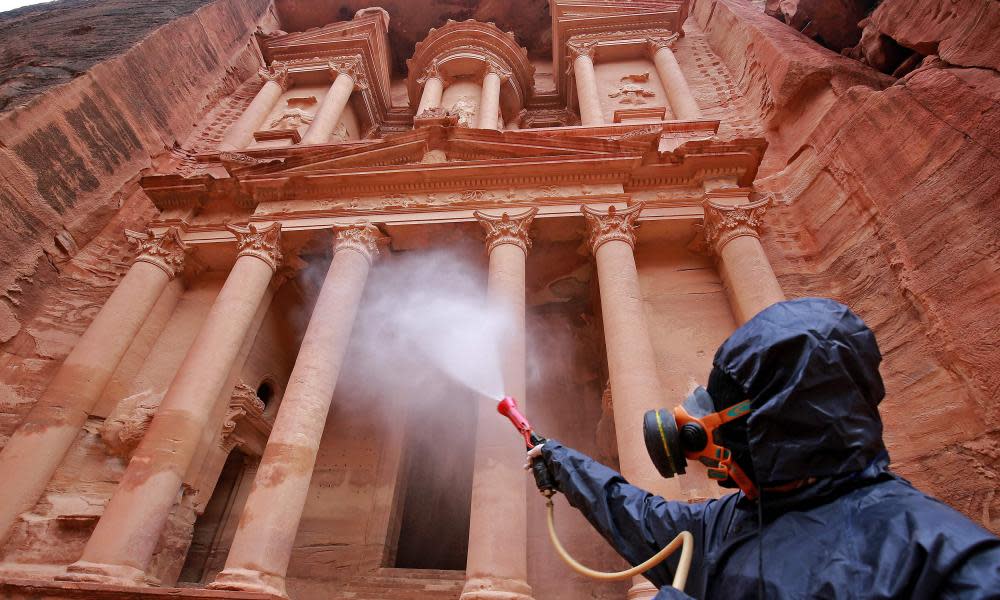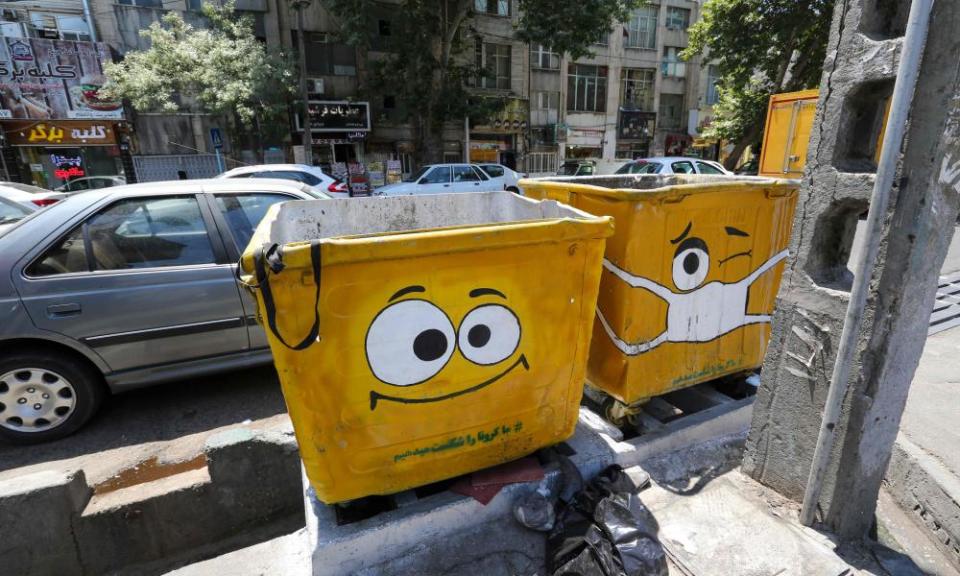Covid-19 in the Middle East: 'Normal life is back – including the tensions'

How has lockdown been for you in Jordan?
For most people, the first few days and weeks were pretty scary. We were reading stories about hospitals being overwhelmed, death rates growing exponentially. It’s never been as high here as it has been in Europe, but we did feel it here early on. It felt initially like an adrenaline rush. Jordan had one of the harshest lockdowns – for a period, you couldn’t leave your home for any reason, including to get water, food, medicine. It rose and fell quite quickly though – now it’s deemed one of the safest places in the world and the authorities claim to have eradicated the virus here. So life has pretty much returned to normal for now - people hug and kiss and socialise much like they used to. It’s disconcerting to read about what’s happening in parts of Europe and the US.
How has your work as a journalist been affected?
I’ve never gone so long without getting on a plane – never so long in the same country or even city. Even in the month before lockdown, I was in Kenya, Ethiopia, Burkina Faso, and I rushed to get back here. I did go on a trip to Petra, which would normally be one of Jordan’s big tourism draws, and it was completely empty, which was incredibly strange. It was peak tourist season and I basically had it to myself. Like many people, I’ve just been doing my work via Zoom and phone, which is quite limiting. Everyone who does this kind of job knows the importance of being able to talk to people, breathe the air of a story and get a real sense of what’s happening. It gives journalism texture which can’t be faked. So that’s a real challenge.
So now we’re relying on others to be our eyes and ears. People’s day-to-day stories are similar across the world right now, in that many of us are predominantly experiencing the world from inside our homes, but it’s not really conducive for good journalism.
Which regions have been worst hit?
The worst outbreaks so far have been in Iran and the international hubs like the UAE and Qatar, but Saudi Arabia and Israel have also been hit hard. It is a strange region in that it’s hard to get a sense of how bad the situation really is because the media lacks transparency. Hassan Rouhani said a few weeks ago that something like 25 million Iranians might have contracted Covid-19 – which, if true, is astonishingly high. So that’s possibly a glimpse of just how bad it might be there.
The Middle East is pretty exposed – those hit hardest are those who can’t work from home and people in countries without a social welfare system. The region has huge informal economies and very weak safety nets, so workers here are hit so much harder than in other economies. Lockdown has come on top of – and exacerbated – a huge collapse in oil prices. Saudi Arabia and Iraq draw huge amounts of revenue from oil, and countries around them like Jordan send huge numbers of workers to those places, so the effect mushrooms.
There are huge numbers of refugees and there’s been a lot of focus on the big refugee settlements, and governments like Jordan have been really proactive about protecting them. The virus seems to target poorer people, those in poor health, who live in worse conditions, and those who don’t have the luxury of not working. But the data is much less available to be able to break the outbreak down along the lines of race or class.

How do you think the pandemic will affect relations in the region?
It’s a bit early to tell, because it’s still happening. In the beginning it seemed as though most countries were so consumed with themselves that a lot of the political issues we normally cover seemed to fall into the background. It’s only in the last month or so that normal life – including those tensions – have been felt again. The main fault lines that have begun to rumble again are tensions between Iran, Israel and the US, and between Israel and Hezbollah in Lebanon, and of course the annexation issue.
I have wondered whether some countries try to take advantage of the weakness of others. Will Iran’s enemies try to take advantage of the scale of the pandemic there, to try to strike Iranian targets? Netanyahu has been criticised for his response to the crisis – I wonder if he will try to distract from that by attacking Lebanon. Equally, Hezbollah is under pressure in Lebanon’s ongoing political and economic crisis, so will they stage some kind of attack on Israel? In the Middle East, the pandemic is coming on top of a lot of other factors which contribute to uncertainty and instability, but these factors, which make the region poorer, will naturally lead to tensions, and we’re just waiting to see how they will manifest.
Have there been any positive news stories amid the pandemic?
A lot of the positive things to come out of the pandemic in the UK – closer communities, more emphasis on keeping fit, more potential for flexible working – are really advanced-economy traits. In a poorer region, a pandemic is something that affects people’s ability to earn a livelihood. After all, there can’t be an increase in e-commerce if people don’t have a bank account. It may be that, in time, people realise the importance of promoting local industries and creating local employment by manufacturing their own medical equipment, and so on. One of the reasons a country like Jordan has weathered the crisis quite well is that a lot of investment has come its way from people endorsing its response. The Jordanian government hopes this reputation will build trust from other nations that see it as being a stable country in an unstable world. But if one country is seen as being stable, it’s only because others near it aren’t, and that’s not a good thing for anyone.
Have people adhered to the rules?
When the government asked people to stay at home, it was generally adhered to, especially after they started to arrest people. They were able to implement lockdown pretty effectively. The local transmission rate has now been at zero for over a month and people were initially very militant, but people have become more complacent now. We’re at a stage now when we’re not really afraid of it, the initial sense of solidarity has faded, but equally there isn’t an end in sight. We don’t know when a vaccine will be introduced. We’re over the rush of it all, but without relief anywhere in view, so it’s a real test of morale and stamina, as well as ability to survive economically. We’re in a culture that is so used to things changing quickly, but we’re going to have to keep going for another few months because the lockdown rules might have disappeared, but the virus is still with us.
In Jordan, the healthcare system can absorb a rate of up to around 200 new infections a day, and thankfully we didn’t exceed that at any point
How have the different faith communities coped in the crisis?
In parts of south Asia, there was active tension between the clergy and the government. I think in the Middle East, most people understand that the government has the final say. Mosques were closed throughout Eid and Ramadan, which was really hard for people because being part of one’s faith community is so important for those festivals. But a lot of religious leaders actually cited examples of precedent in scripture when people had to stay away from mosque, and that was encouraged. They’ve said that Sharia law at its most basic level is about preserving life. I was recently talking to a Syrian refugee who said he had observed Ramadan amid bombings, and now he has his family round him and is safe, so it feels easy by comparison.
What are your predictions for the next few months?
The death toll will slow, but I expect the social toll is likely to grow exponentially as businesses start to declare bankruptcy, mental health continues to be affected, and people grow increasingly bored and frustrated. It felt as if the forces that normally keep the world spinning were suspended for a few months, but they’re coming back now, but with this virus now an added challenge. It feels like a horrible confluence of events.
In Jordan, the healthcare system can absorb a rate of up to around 200 new infections a day, and thankfully we didn’t exceed that at any point. No systems have yet collapsed, but, that said, we have difficulties ahead.
What sets the Guardian apart in its reporting on this issue?
The governments in this region are not transparent. Their response to this crisis, in a lot of cases, has been to hide the scale of it. They want to tell the story that things are getting better and normal life is back. The Guardian can tell stories about this that local news operations can’t. Even in Jordan, people have been arrested for telling stories about the economic impact. In Egypt, our correspondent was kicked out for writing about the possible scale of infections there. In Lebanon and Syria, there are reports that militias are treating huge numbers of patients; local media could never tell those stories. So this pandemic has shown the importance of foreign reporters. At a time when the media are more restricted than ever, they have the freedom to tell the stories that local journalists simply aren’t allowed to tell.


